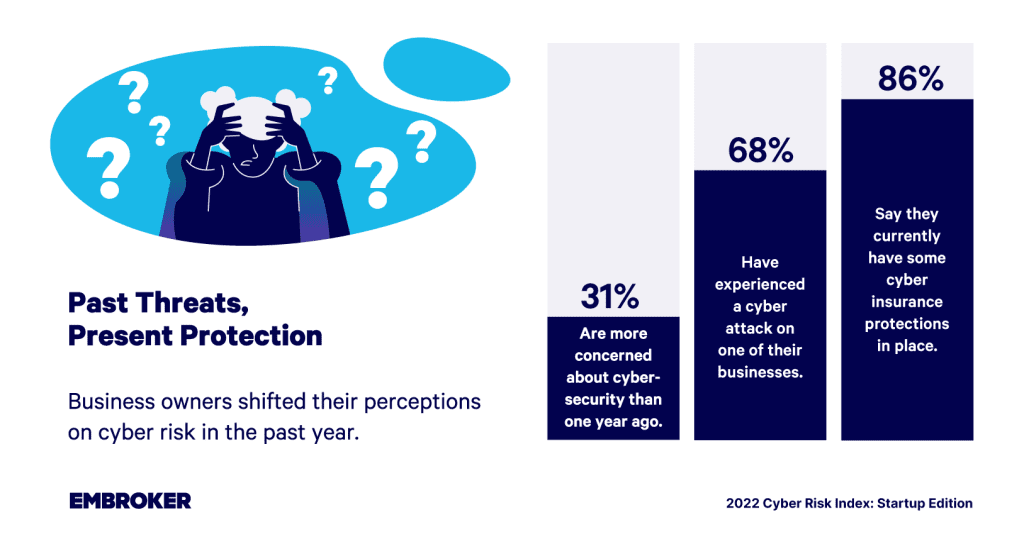Cyber Risk Report 2022: How Founders are Handling Cyber Security in Today’s Climate

How big of a deal is cyber security anyway? It’s no secret founders have a lot on their plate. VC’s are no longer cutting large checks, we’re in the midst of a recession, and the pandemic hangover has created operational difficulties across the board. We surveyed over 400 VC-backed startups to find out how they’re dealing with the current economic headwinds, and how concerned they are about cyber security, among the other issues they’re facing for our new Cyber Security Report: Startup Edition.
Cyber Security concerns are on the rise
Notably, the survey results reveal that more than two-thirds (68%) of founders have experienced a cyber attack on one of their businesses. This probably explains why the majority (86%) of founders said they have some cyber insurance protections in place. But even with policies in place, 71% said they’re considering additional cyber protections and tools for 2023.
Concerns about cyber security are on-the-rise among founders, with nearly one-third (31%) more concerned about cyber security threats than a year ago. In fact, 14% more founders believe they’ll suffer an attack than at this time last year (36% in 2021 to 50% in 2022).
The high percentage of startups with cyber insurance can partially be attributed to pressures from investors and/or board members, as nearly half (49%) cite cyber security insurance protections as required by one or both of these entities. However, it’s more than just internal factors that drive founders to re-evaluate their cyber risk. Founders report that external factors like global events are having a marked effect. When purchasing cyber insurance, founders cite their decisions as most motivated by (a.) tensions around foreign relations (40%), (b.) media coverage on other company data breaches (35%), and (c.) managing a hybrid/remote workforce (32%).
We’ve actually seen this play out with our own customers. Shortly after the start of the war in Ukraine, we saw a 50% increase in the number of applications submitted for cyber policies. It also shows exactly how current events are driving business decisions in real-time. With increased coverage of the war between Russia and Ukraine, it makes sense that founders had concerns over potential retaliatory cyber attacks from Russia on U.S. infrastructure and businesses.
Is cyber risk on the rise?
Read our 2022 Cyber Risk Index Report to find out what businesses are worried about, how they’re protecting themselves, and what the future holds.
Download The REport
Startups get serious about cyber insurance
A majority of startups have substantial cyber insurance coverage but are uncertain about how much risk is truly covered. Of founders that said their company has cyber insurance (86%), over 52% described their type of coverage as either “customized to our needs” or “the most comprehensive” package available. Yet, half of the startups with cyber insurance stated that their current policy would only partially cover their risk in the event of an attack or breach. Additionally, of those surveyed that lack cyber insurance, the number one reason cited for this was cost (44%). (Does this sound like you? Our team can help you find cyber insurance at a cost that fits your business).
Looking toward 2023 and beyond
As founders look forward to 2023, they are most concerned with impacts from inflation (32%), cyber attacks (27%), and supply chain challenges (26%). This represents a shift from earlier this year. In our Startup Risk Index Report conducted in February 2022, founders listed their top three concerns as inflation, supply chain issues, and competition. At the time, cyber security didn’t rank.
But now, the top three “non-negotiable areas of investment” for the coming year are: product innovation (32%), cyber security protection (31%), and equipment upgrades (30%). This reinforces how focused founders are on better protecting and shoring up their company infrastructure and equipment.
To find out more about how founders are treating cyber protections in their businesses, download our Cyber Security Report: Startup Edition.



